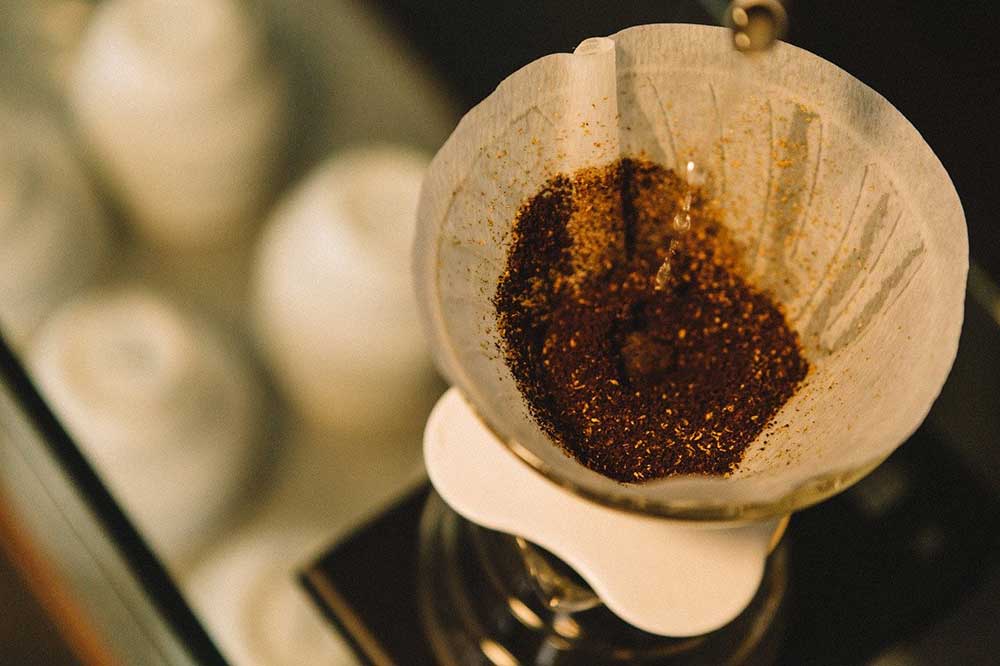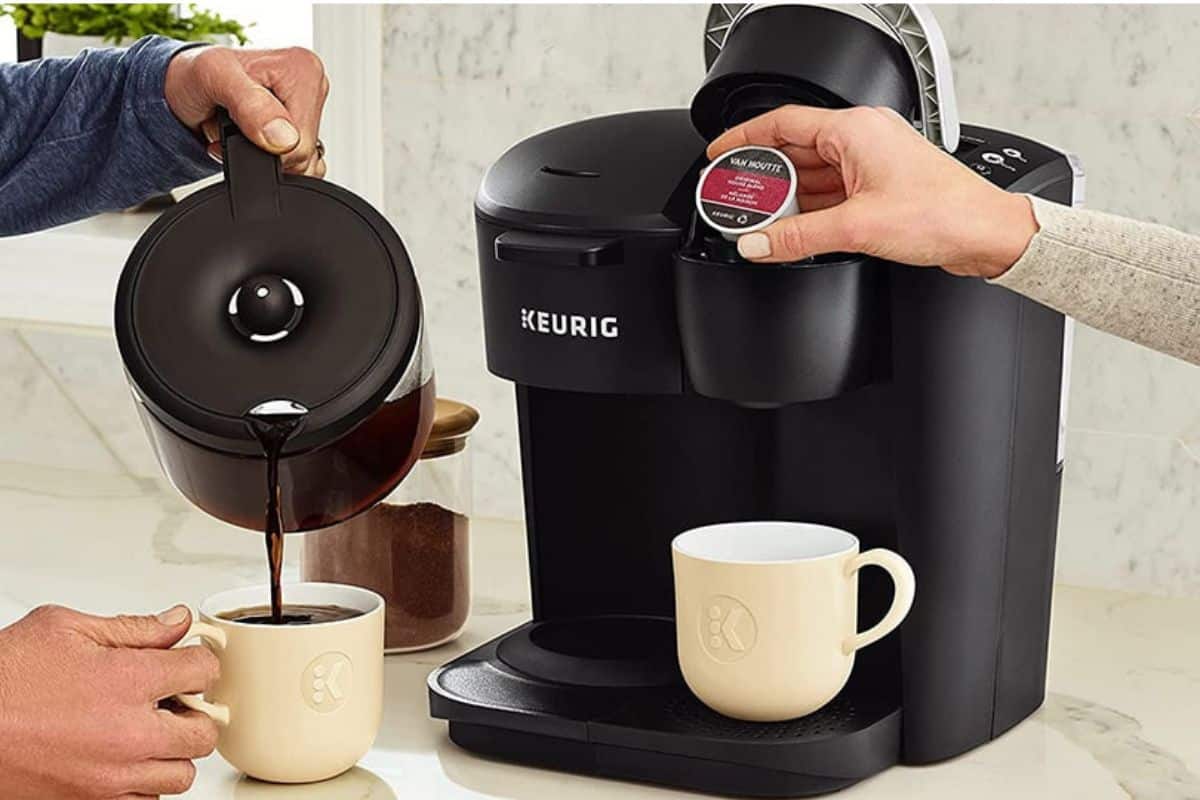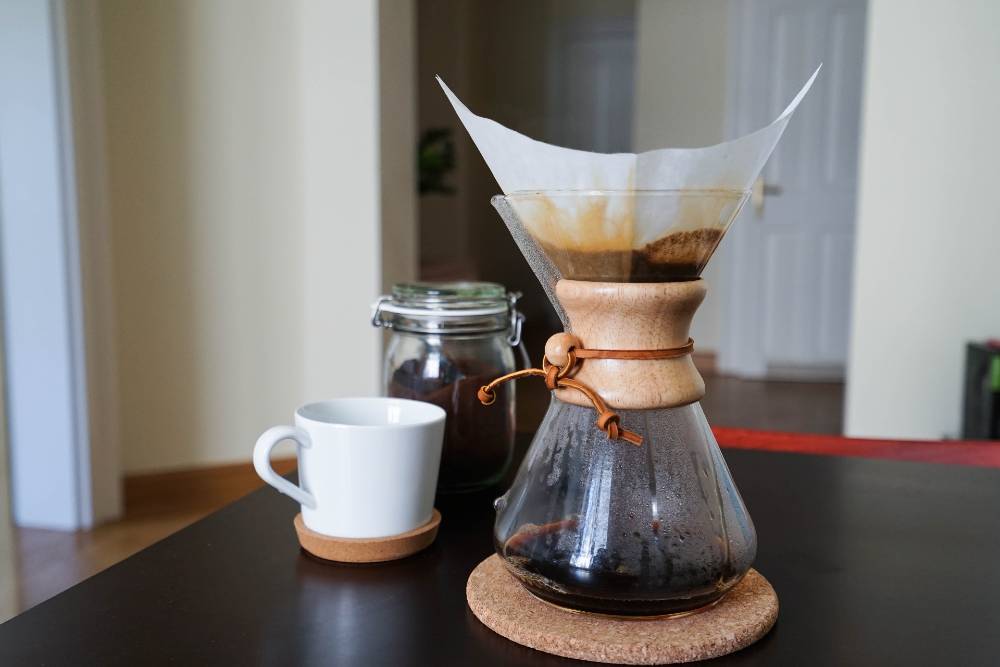You look at the bin full of coffee filters and it just starts to feel wasteful, then you look into your garden and wonder…
Are coffee filters compostable? Are they biodegradable?
Like you I wondered the same thing, I’m all for saving the environment so I did all the research to find out.
As a general rule all paper coffee filters are fully compostable and biodegradable, and if you want to be extra eco-friendly you can opt for brown unbleached paper filters which compost even more efficiently than white coffee filters.
Non-paper filters, so plastic filters, cloth filters, or metal filters are of course not compostable, but if you don’t have easy access to compost then paper and metal filters might be a good choice because they are reusable.
But if you do have a compost then adding paper filters is a great way to bulk it out and neutralize odors so it doesn’t stink up the whole garden every time you take the lid off!
But that’s not all there is to it. Let’s take a look at some of the other factors to consider when you’re composting your coffee filter.
Bleached Vs Unbleached Filters

These are the two main types of paper coffee filter.
Brown paper Filters
These are the better choice, better for the environment and they compost quicker than bleached alternatives, plus not having bleach in your diet can only be a good thing right?
It’s not all roses though and slightly more care needs to be taken when using a brown filter, namely in that you have to wet it before you add coffee to it. You need to pour in some water to wet the whole thing, dump that water out and then brew as normal.
This makes sure no papery taste is introduced to your coffee and ensures any bacteria is removed that could be present since it wasn’t bleached.
After that, you can put them in the compost and they decompose nicely, being all-natural and completely biodegradable.
White Bleached Paper Coffee Filters
Brown is the natural color of paper and all white paper has been bleached using either a chlorine method or an oxygen method. The oxygen method is generally considered to be the “healthier way” even though no chlorine is supposed to pass from the filter into the coffee you never know.
Chlorine is usually the cheaper method which is why it’s important to go for a quality coffee filter. Remember you’re here to build towards an Above Average cup of coffee and to do that it’s about getting all the little wins in place, and what better win than a quality coffee filter.
Once you’re finished with it you can still put these in your compost because it’s still an organic compound that will break down, there’s just a chance it will take a little longer. But follow my tips below on how to compost a coffee filter and you’ll be fine.
Are Other Coffee Machine Filters Compostable?
A few different machines sometimes have slightly different filters so let’s go through the list.
Are Chemex filters Compostable?
Are you using paper filters? Then yes they are! As long as it’s a paper filter it doesn’t matter if it’s a square, a circle, brown or white, your Chemex filters are indeed biodegradable.
Are Melitta Coffee Filters compostable?
Same as above, as long you’re using a paper filter that doesn’t have a plastic lining your Melitta coffee filter will be biodegradable and can be put in your compost pile.
Are Bamboo Coffee Filters Compostable?
A little more tricky to find this one out, kudos to you for using a bamboo filter, a great choice for the environment. Well as long as it’s a bamboo-paper filter it should be biodegradable, I’d check with the manufacturer on a case by case basis though.
<br>
And if it’s a bamboo reusable filter then no, It’s very unlikely it can be composted, but again check with the manufacturer because you never know.
Are Coffee filters bad for the environment?
It depends on what you do with them. If you’re using 10 of them a day and they’re all going straight into the garbage then that’s not going to be great for the environment.
But if you either use a reusable coffee filter or you’re composting your biodegradable paper filters then I don’t see it being bad for the environment.
How long do coffee filters take to decompose?
This is a tricky question to answer, because the time for compost to decompose depends on a lot of factors, what’s gone into it already, how long it’s existed beforehand, humidity, temperature, time of year.
But generally, you’re going to be looking at 6-8 months for them to decompose fully and be unrecognisable. This is pretty standard for most organic products you add to it and you’ll want to make sure you’re using a pitchfork to turn the compost layers every 1-2 weeks to keep the whole process moving along nicely.
How To Compost Coffee Filters
Did you think you could just throw them from your coffee machine straight on top of the compost? No such luck!
Well, you could do that to be honest, but it just won’t work as well and isn’t as smooth a process. So first step…
Step 1. Compost The Grounds And Filters
Bit of an obvious one but don’t empty the coffee grounds into the garbage can to only compost the filters, the ground, used beans are great fertilizer and provide a lot of key nutrients that your plants thrive on, so you’re going to want to get them in there and all.
Step 2. Tear The Filter Apart
As a whole piece, it’s going to take much longer for the whole thing to biodegrade, you’re going to be much better off tearing up the filters into smaller pieces to get the process started quickly. The filter is already wet so tearing it apart isn’t too hard but you might want to wear gloves to keep your hands clean and to wait till it cools so you don’t burn yourself.
Step 3. Add Them After Each use
Coffee filters can be composted, but you can’t make compost using only coffee filters, it needs to be a good mix of vegetation and organic matter to make good compost, coffee grounds and filters alone won’t cut it.
Neither will bulk-adding huge amounts at once, that’s just going to completely slow the process down, you’re going to want to add each filter after each use, don’t save them to do it all at once. Though I don’t know why you would in the first place!
Step 4. Mix Them Through Or Add Worms
Finally, they need to be wet to properly decompose, especially the coffee grounds, if they’re dry it will take much longer. So mix them through thoroughly so they don’t dry out on top and even consider adding in some water if you need to. However, mixing it with a pitchfork should do the same job.
Or, worms do a great job at breaking down the filters, I read on a forum about one guy who has a 5-tray worm factory that breaks down a filter in a matter of a week. Not for everyone but if you’re an avid gardener and you’re drinking a lot of coffee this could be the perfect solution!
Do Coffee Filters Contain Plastic?
Unfortunately, it’s the annoying answer, it depends. Of course, a plastic filter contains plastic but with paper filters, they shouldn’t contain plastic, and I have no reason to believe that they do, but big manufacturers deserve some scepticism and who knows what happens in the bleaching process so stick with either a reusable filter or a brown filter.
And check the packaging on your filters or potentially give them a google to check what they’re made with.
Are Coffee Filters Recyclable?
They are not, not in the way that other paper is recyclable, the only good use of them is in the compost and if you’re using a plastic coating filter then you’re going to have to put it in the garbage after you’re done with it.
Well Then Are Coffee Filters Biodegradable?
Why yes they are! It goes one way, I believe all compostable materials are biodegradable but not all biodegradable materials are compostable if that makes sense.
But for paper coffee filters they’re both, they biodegrade and they’re compostable, it just takes a little while so you have to be patient with the process.
Conclusion
And there you have it, if you’re looking to make a change you’re going to want to go for a brown unbleached coffee filter because these are the most biodegradable and the best to go in the compost.
Alternatively, you can look into getting a reusable coffee filter, just make sure you get a high-quality one that’s durable enough to last so that you don’t end up going through a reusable coffee filter every single week!
Related Reading
8 Ways To Make Coffee Without A Filter (2021 Edition)
18 Best Reusable & Paper Coffee Filters 2021 – For Every Coffee Maker
10 Best Coffee Maker With Reusable Filter (Permanent Filter For Less Waste)





